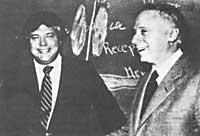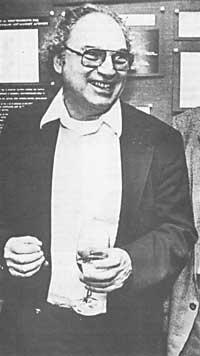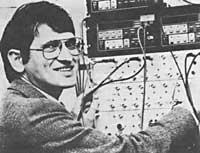Nobel Prize 1985
Medicine: Medicine: The truth of cholesterol

Heart diseases are one of the great killer factors in the developed world. The Nobel Prize in Medicine and Physiology has been awarded by Doctors Michael Brown and Joseph Goldstein, who over the past twenty years have worked on understanding these diseases.
Joseph Golstein and Michael Brown conducted medical studies at the University of Texas in Dallas. At present both continue to be leaders of the Area of Molecular Genetics and the Area of Genetic Diseases respectively.
In 1973 it was shown that specific receptors were transported to our cells. His work also led him to differentiate between "good cholesterol" and "bad". In this way, we could understand the cycle of regulation of cholesterol, which completely transformed the clinical approach to cardiovascular diseases.
Although for our organism cholesterol has been necessary, it cannot circulate freely through the blood. It is related to soluble proteins, formed by lipoprotein. Lipoprotenies are of two types, different in weight and function. High-density particles attribute excess cholesterol to the liver. The rest, of low density, are the source of cardiovascular diseases. When their concentration is excessive in blood they are deposited on the walls of the arteries and form arterial plaques.
Membranes receptors found by Goldstein and Brown in normal conditions control the concentration of "bad" cholesterol. These receptors are abundant in the liver and endocrine glands. In turn, they perform two functions: maintain a constant level of cholesterol in the blood and transport it to cells that need low density cholesterol.
Twelve years after the discovery of receptors, cholesterol receptors have been identified and isolated. The gene that governs (in chromosome 19) has also been localized and cloned.
These small structures of conversation have made it possible if it is very frequent (one of every 500 supports it). Understand the formation of genetic hypercholesterolemia. Their origin is found in the malfunction of these receptors.

Goldstein and Brown will allow in a short term to find suitable treatments against these diseases.
Chemistry: Chemistry: Prize not received by a chemical
Jérôme Karle and Herber A. Although the Hauptman have received the 1985 Nobel Prize in Chemistry, they are not chemists, physicists and mathematicians respectively. They have been awarded for laying the foundations of X-ray crystallography. This technique allows to understand the structure of matter.
Jérome Karle is 67 years old and works in Washington's remarkable research laboratory. Herbert A. Hauptman, 68, works in a private center dedicated to medical research in Buffalo.
Both researchers carried out their work in 1953 to 1965. The aim of this work was to make possible the direct determination of crystalline structures.
The work of both consisted in putting mathematical tools to analyze the image provided by the molecules subjected to X-rays. The almost automatic determination of crystallographic structures, which allows the method developed by Karle and Hauptman, is of great interest when in chemistry, biology and medicine a precise knowledge of the molecules is required.
X-ray crystallography is today a routine technique in many laboratories, although many users do not understand the underlying mathematical instrument.
Physics: Physics: Young people win
With Klaus von Kliters, the "Hall effect" has come out of the dictionary of specialized elites and has passed to the daily dictionary thanks to the Nobel Prize in Physics.
This young German physicist was born in the Polish town of Schroole in 1943, when the Second World War was in full swing. Fifteen are the German physicists awarded the Nobel Prize.
He studied at the University of Würzburg, worked in Oxford and Grenoble and is now director of the Solid State Physics Program at the Marx Planck Institute in Stuttgart.
What is the Hall effect?
The Hall effect is named in honor of its discoverer Edwin Herbert Hall. This discovery took place a hundred years ago, in 1879. This serrería effect is produced with electricity. Imagine a driver, like gold, by which an electric current is passed in a given direction. On the conductor, a magnetic field of foot is then applied to the direction of the current. Then appears a transversal tension with respect to the direction of the electric current and the magnetic field, the Hall effect.
The sign of this indirect voltage leads to know the sign of the electric charge of the conveyors that drive the current. For example, in conductors such as copper and gold, the transporters are electrons. Later, the scientists discovered that in some semiconductors the conveyors had signs contrary to the gold transporters.

Over thirty years of larogeitos, the Hall effect has been nothing more than a useful tool for detecting the load of the load conveyors. However, since 1968, the integrated circuit technique considerably enlarges the field of application of the Hall effect. It is used, for example, in car lighting, on the keyboard of typing machines and on computers.
The work of Klaus von Kliters has been to express that the Hall effect is a quantum phenomenon.
This Nobel Prize awarded to von Kliters has not been very well accepted in many physical environments. According to them, von Kliters has been awarded too quickly and quickly.
Although humbly, from Elhuyar we try to follow the pulse of science. And when possible, of course! That is, what has happened with the quantum effect Hall, Nobel Prize. In the book "Where Science and Technology Go" we published earlier this year, "How Many Ways Physics Has Traveled." M. M. Etxenike announced the Nobel Prize that the Hall effect could receive. And also!
Buletina
Bidali zure helbide elektronikoa eta jaso asteroko buletina zure sarrera-ontzian









